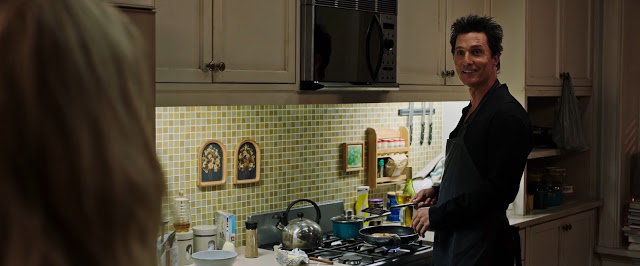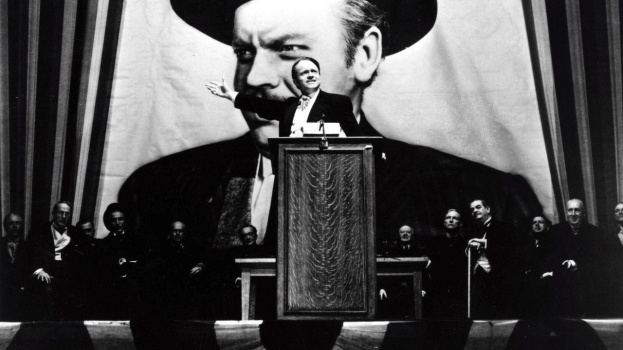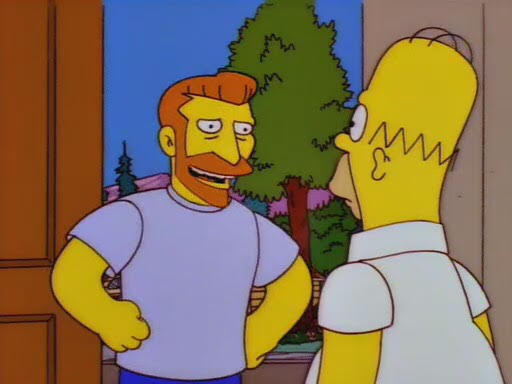 Citizen Kane
Citizen Kane
Directed by Orson Welles
…

JOEL
Barbican Comic Forum
00000000 / Kraken
Brain Teeth
“It’s his sled. It was a sled from when he was a kid. There. I just saved you two long, boobless hours.”
I’ll admit upfront that I love the mental whiplash of going from Avengers: Endgame into… this. A film from almost a century ago. Beloved and feted over in all the ways that Endgame is not. When your cinephiles and film lovers turn their noses up at the piss-poor state of movies today Citizen Kane is the gold standard on which they’re judging things. When they say “films today just aren’t as good as they used to be” – this picture is one the high water mark below which everything else has fallen.
Considered by many critics, filmmakers, and fans to be the greatest film ever made, Citizen Kane was voted as such in five consecutive British Film Institute Sight & Sound polls of critics, and it topped the American Film Institute‘s 100 Years … 100 Movies list in 1998, as well as its 2007 update. Citizen Kane is particularly praised for Gregg Toland‘s cinematography, Robert Wise‘s editing, its music, and its narrative structure, all of which have been considered innovative and precedent-setting.
(I’d love it so much if this generated as much conversation as we did with Avengers Endgame – but I guess that might be setting my sights just a little too high?)
At this point you might be expecting me to go all contrary and start nitpicking all the ways that it is nowhere as near as good as everyone makes out. And it’s actually secretly racist and full of evil neoliberal ideology or whatever. But nah – I’m as much a fan as most people. For a long time it was the seemingly the very last and biggest film on my list of “FILMS I KNOW I NEED TO SEE” and I was pretty nervous that after all that build up and expectation it would be nowhere near as good as everyone said it was. “The greatest film ever made?” (Oh wow – that’s a lot to live up to you know?).
But yeah as cheesy as it is to admit that first time I saw it I was pretty stunned by how modern the fucking thing is. I’m struggling now to think of examples (so far I’ve only seen it that one time – which was a bit of a while back now): but I just remembered that it kept doing all of these cool things with lighting and editing and composition and stuff. I think there’s a scene where most of the characters are lit so that they’re just faceless shadows? And there’s a bit where you can see a kid playing through the window in the background while everyone is talking in the foreground. I mean – it’s really simple obvious stuff but no one seems to do it even now. Maybe because Orson got there first and they don’t want to seem like copycats? I don’t know… My best guess is that it’s the thing that the person who gets to the best ideas first ends up being the ones that own them and everyone who comes after has to find ways to work around the things that have already been snatched up.

Looking over the wikipedia page my eyes nearly jumped out of my head when I saw that it’s edited by Robert Wise??! That’s a little insane. Dude directed some of my favourite films: The Day the Earth Stood Still (1951); The Haunting; Star Trek: The Motion Picture (LONG LIVE THE DIRECTOR’S CUT) and – my most favourite – The Andromeda Strain. And oh yeah: he also directed something called The Sound of Music too. Which you know is all to say: hmmmm – I wonder how much of the credit of this thing should be going to old Orson? (see also: Richard Chew, Paul Hirsch, and Marcia Lucas? The editors who apparently rescued Star Wars).
Altho Star Wars has spaceships and lazar swords and a franchise that looks like it’ll survive the heat death of the universe. While (so far) Citizen Kane is only one movie. I wonder how long it’ll take for them to do a star-studded remake and make it a movie relevant to 21st Century concerns? *thinking.emoji* Maybe instead of Rosebud being the name of his sled – it could be a pokémon instead?
(Wait: How many old movies does Netflix have? Give it a few more generations and will people still know how to watch them? Hell saying that: I wonder what most people’s reaction to watching Citizen Kane would be like? Is it not having enough faith in people to imagine that most of them would probably be pretty bored and share the same sort of reaction as Peter Griffin? I mean we all agree that watching a film is a skill you have to work on – right?).
Also: I know that most people already know the whole Orson Welles / Final Film / The Transformers: The Movie / Unicron thing. But how many of you have seen the uttermost wonderfulness of watching him trying to sell Paul Masson Wine? (Yes. You’re welcome).
What do you think?

JONATHAN
Barbican Comic Forum
Twitter
So Citizen Kane, it’s rubbish right. I mean talk about on the nose, his sled the “symbol of lost youth an innocence” and stand in for his immortal soul is covered in pristine snow at the beginning, then lost, and by the end is burning in a fire with all the possessions he can’t take with him. He traps his second wife (literally a songbird) in a cage in “the biggest private zoo since Noah”, and at the end while pondering Rosebud and saying how much of a puzzle it all is, the journalist is actually playing with a jigsaw. Orson Welles, you jaded hack!
Except of course that you can play this game all day with a film which is so rich that you can find treasure in every frame, and with a story to unpack in every scene. What is more horrifying? Kane’s Dracula’s castle that he built for himself, or the dead eyed stare of his mother who had his bags packed for a week? You don’t need a sled to tell you that Charles Foster Kane, despite having everything will never be able to fill the void inside of him. When he’s pleading with Susan to stay, he’s being selfish but he also knows she was his last hope of redemption walking out the door.

Weirdly, as it accounts the tragedies and compromises Kane makes, the film mentions early on that his first wife and son die, and then it’s never mentioned again. In many films this would have been enough of an event to justify his decline, even the Godfather, one of the few films that could perhaps stand up to to Citizen Kane in breadth and depth, has its eponymous character finally give up when they kill his boy. But Citizen Kane just throws this on to the huge detail pile, refusing to make any defining or consistent statements about its main character, but leaving it all there for the audience to assemble.
What sort of movie even is this? It’s a biopic of man who doesn’t exist, of someone who is simultaneously a failure and incredibly wealthy, a horror film of a generous man of the people who is also a terrifying monster, who had everything and was a completely empty zombie, a love film about a man who maybe never loved anyone. One of its final shots, the infinite mirror showing infinite Charles Foster Kane’s signalling that this is very much a Choose Your Own Adventure deal.
This was Orson Welles’ first damn movie and fuck if he left it all out there on the field. It feels like a hack thing to call this a masterpiece, especially because Hollywood politics means we probably lost other masterpieces along the way, but its simply a work of genius. Someone asked me how it compares to a spectacle like Endgame and so I guess it’s like comparing a symphony to a very long rock concert. You might enjoy the rock concert more, you might still be humming the tunes, but you know who the good musicians are and they aren’t playing in a rock band.

JOEL
Barbican Comic Forum
00000000 / Kraken
Brain Teeth
I didn’t realise how sad Citizen Kane is. And it kinda caught me unawares.Yes I’m the guy that bitches about the state of movies in 2019 but I still end up watching most of them (what can I say? I’m an addict): especially the big shiny glossy ones with their empty promises and delicious insights into the prevailing ideologies of our time. One of the interesting side effects tho of snacking on Marvel movies and their ilk is that you end up with a very distorting picture of what a movie / story is supposed to be.
“Oh yeah – a movie. I know what that is. It turns out that someone is the chosen one and they have magical powers and they’re better than everyone else – and then they have to have an adventure where they fight various obstacles until finally their worth is proven, they’ve undergone somesort of positive change and then everything ends in a cool happy way (with the promise of a sequel or two).”
*cough Enter the Spider-Verse cough*
In fact – because I’m an idiot and because I read the books – I watched The Dark Tower last week and it was barely more than that previous paragraph. Although it did have Matthew McConaughey as the bad guy who’s so evil that he’s always dressed in black so much so that when he shows up in the good guy’s house making chicken he’s also wearing an evil black apron (which is the kind of attention to detail that I kinda get a kick out of).

Also he repeatedly kills people by telling them to “stop breathing” – which I must admit I kinda love…
Wait – what was I saying?
Oh yeah. So that’s basically the way that movies are supposed to work / supposed to be. And every movie is basically somekinda twist or flourish on that basic blueprint right? (So for those of you who haven’t seen Citizen Kane you’d probably imagine (like I did) that the basic plot would be this Citizen Kane guy fighting a bunch of evil-doers who were standing in his way until eventually he managed to prove himself as the best citizen or something and then wins the girl. And maybe people say it’s the best movie of all time because it all looks really cool and there’s a final fight scene that’s totally kickass or whatever).
What’s interesting is how people react when movies and stories don’t live up to that kinda blueprint and the stuff that comes out. The Dark Tower (to the surprise of no one reading this I’m sure) is not a very good movie. It’s dull and boring and borderline incomprehensible and both Idris Elba and Matthew McConaughey seem less like they’re doing acting and more like they’re doing cosplay. It’s trying to match up to the “movie blueprint” – it’s just not doing a very good job. And so yeah – people dissed it. Which makes total sense.

(Holy wow. This picture man. I’ve seen it – so now you must too).
Then you have stuff like Game of Thrones (I’m sorry I’m talking about Game of Thrones again): and you’d have stuck like certain characters not following a redemptive arc and instead going “fuck it – I’m not going to the right thing – I’m going to do the wrong thing instead.” And wow yeah – judging from the parts of the internet that I’ve read – people were pissed. Mostly it seemed because of this idea of “that’s not how stories are supposed to go.” You know – characters are supposed to get better and triumph and win the day and anything that is not that means that something is wrong and we need better writers or whatever etc.
My point here is not to dump on those people who are outraged (as fun as it may be). But instead to consider the reasons why people think in these ways and well yeah: my basic theory is that if every movie you’ve ever watched is following this blueprint of how a movie is supposed to work and any digression from this just means that you’ve messed up.
I wonder then how a modern audience would approach watching Citizen Kane which basically manages to get all of it’s storytelling “wrong” from the beginning all the way til the end.

Killing the main character in the first few minutes? Then cutting to a newsreel that gives you all of the details of his life and therefore the whole story of the film? I mean – I know they burn the sledge at the end but the whole film is basically a bonfire – taking ideas and moments and stories that would sustain whole films (A mother sends her child away, A marriage falls apart, a politician tries to fight corruption, a newspaperman sells out his principals, A star is (still)born, a rich man wastes away in his lonely castle, a detective story about the meaning of a word etc) and just flings them all in one after another like logs on a fire. Watching them all burn one after another is kinda… beautiful?
But the really interesting thing I found was that it made me realise the pretty obvious of: oh shit. Maybe there’s different ways of telling stories / making films? Maybe every story doesn’t need to be about Will to Power and Believing in Yourself and Taking a Leap of Leap or whatever. And maybe a film can affect your emotional state in different ways apart from just making you happy or whatever…

And yeah yeah: I hear people out there already saying: “Well – if you look outside the Hollywood based system then you’ll find all sorts of movies that don’t follow the Hero’s Journey.” Except what those people don’t tell you is that the majority of art house films are boring and predictable in their own way and are often so disdainful of the idea of telling something as uncouth as a story that they basically just meander around aimlessly for most of their running time before ending up on some kinda strained note of ambiguity. And yeah ok – maybe I’m just being judgmental or whatever – but I feel like I’ve watched enough of them to know what I’m talking about… (don’t @ me).
And hell maybe Citizen Kane is revered as such a masterpiece because it manages to thread the needle through such a tiny point – it’s not typical but it’s also not boring. It’s counterintuitive but only in a way that you only realise afterwards… And unlike in a typical art house flick – it’s full of lots of stuff happening. Something is always happening.
But yeah – it’s also obviously really sad. In a way that I feel kinda relates in a strange way to the above.

Yes I know that this is probably me looking into the mirror and seeing my own reflection: but I mean shit – I had no idea that the whole film was such a take-down on what all the kids are calling “toxic masculinity” in a way that makes you feel sick about seeing it but also sympathetic about the poor fucker locked inside. Namely – Kane himself. Trying desperately every which way to find love and fucking up / defeating himself at every juncture.
But you know – obviously not in the case of the film: but maybe in thinking about this stuff now. Maybe this is what happens when the only stories / movies you see are the ones that are all about how it’s all about you / the hero and your self-fulfillment / self-actualization? Narcissistic stories spawning narcissistic people…

And yeah I know I’ve said before repeatedly that I don’t ever really relate to characters in movies – but damn it: I’ve got to admit that I did up end feeling a little bit scared watching Charles Foster Kane blunder his way through his life. I’d admit that “wanting to feel loved” is on top of my list of things that I want in life and I know for a fact that I haven’t always been the best at getting that and pushing people away and all the rest of it – so watching Kane run himself into smaller and smaller circles definitely got me spooked. Like: oh shit – is that what the rest of my life has in store for me? Which you know is a strange feeling especially when you mix it in with the idea that the rest of the movie plays with: which is like – hell – maybe he deserves it?
This part in particular has been playing on my mind:
Charles Foster Kane: [pleading] Don’t go, Susan. You mustn’t go. You can’t do this to me.
Susan Alexander Kane: I see. So it’s YOU who this is being done to. It’s not me at all. Not how I feel. Not what it means to me.
[laughs]
Susan Alexander Kane: I can’t do this to you?
[odd smile]
Susan Alexander Kane: Oh, yes I can.
It’s like a chinese finger trap or a möbius strip. Everything is always happening to you. If someone is leaving you – how are you supposed to not see it from your own point of view? How the hell can you manage to see outside and see someone else?

That’s the kinda stuff that keeps me up at night.
And yeah – I don’t know. Of course I realise that in talking about how people can only think of themselves I’m only thinking about myself. But still: it’s sad.
Maybe I’d be better off watching Enter The Spider-Verse instead?

ILIA
The Gap between Panels
Barbican Comic Forum
Twitter / The Hot-Doll Pages
Maybe the reason why I can’t respond in such a direct emotional way to Kane is that the film is so artfully put together – from the ostentatious tracking shots through railings and windows, to the constant use of deep focus, to the structure of the story itself. The only parts of the film that aren’t mediated in some way are the beginning (when Kane dies) and the end (when the secret of his life is revealed). Everything else we see is from the perspective of other characters, reflected in the perspective of a very impressionistic camera – both of which have a kind of distancing effect from Kane himself. He becomes a mystery to solve rather than a multitudes-containing personality to unravel.
In fact, the film could have leaned into that even more – introducing some unreliability and inconsistency to the narrative a la Rashomon. In Kane the testimonies we get all line up rather nicely together: Kane is someone who wants nothing more than to be loved, but who is too arrogant to understand the fallacy of demanding love only on his terms. A real-life personality isn’t a puzzle that fits neatly together, but the film makes Kane into one, only withholding certain pieces from the investigator.
But not from the audience. This is the film’s central (and ultimately rather mundane) thesis. The actors within the drama, much like the audience in the real world, can never be guaranteed final answers. We will never have all the puzzle pieces with which to understand everything about our lives. But a film can give us the final answer. And the fact that it’s a rather unsatisfactory one (his sleigh? really?) is appropriate, suggesting a healthy scepticism about the value of the answers our arts and artifices can provide.

JONATHAN
Barbican Comic Forum
There’s lots of little details which I like about Citizen Kane, it feels like like it was written several times, and one of those times they were trying for a broad comedy.
When Kane first takes over the newspaper he tries to get all his stuff into the Editor’s office despite it clearly being too small. It’s interesting because elsewhere seemingly more important scenes get less time given to them than this weird chat with the editor that could have taken place off screen, or been dealt with in one line. It’s nice because although, as Joel says, this is a tragedy, part of the tragedy is that Charles Foster Kane was a charismatic whirlwind the establishment wasn’t ready for. Even later on when he’s clearly more compromised and running for office you can see he still has that fire in his belly. Maybe as tragic as seeing him abandoned by everyone he was close to is seeing this bold renegade fade away rather than burn out. It’s also all the poignant because of Orson Welles also became a lifetime in his own legend.

Another scene which is almost blink and you’ll miss it the dancing girls scene. When I first saw this I thought it must be typical trailer bait, and not only does it serve no purpose to the plot, it interrupts the scene. But there is a moment in it when Kane gets carried away and tries to kiss one of the girls and without hesitating she pushes him away with a look that says “nah mate” and they both carry on dancing. Maybe it was just a bit of ad-lib but it was kind of nice to see the “eye candy” get to literally push back at the handsome star.
It’s these moments which interest me because as the old cliche goes, a film is written three times, on paper, in production, and in the edit. But it’s interesting how decisions are made in weird moments like this when it’s more than just plot furthering, but it’s also not particularly artful. Maybe it was the editor who liked the improv, or maybe there was a huge wrangle.
Tired editor: “listen Mr Welles, this a long movie, we already had to lose the bit where Kane takes down the mob boss doing freestyle skate tricks on his sled while holding a machine gun in each hand. And we had to cut the section where he hides the secrets to infinite clean energy in the sled, as well as the location of his wife and son who had to fake their own deaths.* I’m beginning to worry that people are going to miss the significance of the sled altogether.
Orson Welles: nope. I want more chat with the editor, the kissing scene, and jigsaw puzzles, hundreds of jigsaw puzzles!
Editor: the kissing bit?!
Welles: yes. It’s key, it tells us he is a ladies man who doesn’t always get his own way.
Editor: but that’s what the entire second act is about.
Welles: quiet you, now kiss me.

I know it’s very on brand for me to segue into a bit about the Simpsons, but in the episode You Only Move Twice, Hank Scorpio visits Homer in his new house. During this scene there is this exchange:
Hank: Hey, look at my feet.
Homer: Okay.
Hank: You like those moccasins? Look in your closet; there’s a pair for you. Don’t like them? Then neither do I! [Throwing moccasins out the door] Get the hell out of here! Heh, ever see a guy say good-bye to a shoe?
Homer: [chuckling] Yes, once.
Now this joke doesn’t make any sense and doesn’t even really work on paper, so how is it so perfect and why does it make me laugh just thinking about it? It might have been improvised by Dan Castellaneta, but someone still had to animate it and it still had to make the edit in one of the funniest 23 minute episodes of the best TV show of all time. These moments and sections interest me because with lesser works you could just write it off as stupid people doing stupid things. But with Orson Welles or the Simpsons creators there are a few clues that when it comes to creative process they have access to another level of confidence in their own abilities – their attitude being that the stupid braying audience will laugh at what their told to laugh at!
*I know what you’re thinking, did Jon just find a way to make Citizen Kane even better?! Yes. Yes I did.
*I…for some reason that involves not reading my emails thought the deadline was this time last week. oh wells…*
*also ignoring low key Joel shade at Spider-verse as sometimes we can have nice things*
So since I absent mindedly stole Jonathan’s birthright to make “the cane from Citizen Kane” jokes in his piece, I should probably get around to writing something.
Isn’t it odd that America, of all countries, says that perhaps it’s greatest artistic achievement in cinema (the most American of mediums) – is a movie about a man whose wealth isn’t simply unable to save him, but arguably damns him, to the pain he’s been haunted by ever since his parents gave him up in the name of a better life?
One fun thing about the movie is that it’s considered a biopic of a media magnate of the era. Said media magnate effectively corralled his power against the movie at it’s time of release and CK barely broke even. It’s legacy has never been commercial but critical.
Can you imagine being one of the most powerful men in America and growing old knowing that despite your best efforts, the best film around is a film that says you’re a sad, bitter old tragedy because of a childhood pain you were never able to reconcile?
Can you imagine being in a cinema and finding out someone made a movie of your life, a movie that paints you as a pitiful pained tragedy? Doing everything you could to stop it and slowly realising you’ll go down as the boy who missed his sled?
Damn.

Also the film itself.
My favourite thing has to be young Kane. When he’s fire-y and charismatic and out to take the world to rights. It’s too much fun watching Orson Welles with a shit eating grin, destroying his own fortune in the name of morality. It’s what makes his ending painful and gripping. Imagine watching Tony Stark go out, years and years after all the Avengers battles, an old man who slowly pushed everyone away because he kept chasing the next mission or goal – until he dies, his work unfinished, his legacy quietly tarnished and utterly alone.
There was a seemingly unshakeable man here once, someone who had the opportunity and nerve to take the “bad things” to task. And at the end, because he undid all of that, all because he wanted to feel loved. It’s quite refreshing, we’re always told we need (and ofc want) love. It’s the thing that’ll fix us. Make us happy. Complete us. Make us run marathons and cure cancer. And yet in Citizen Kane, love, or the doomed pursuit of it, seems to damn him. Kane gets love, but it doesn’t redeem him. He has a wife who he loves him, but that isn’t enough – he needs the singer who calls to something he once lost. He has friends who loved him through his Shakespearean faults, but he pushes away from them.
So to me, Kane is a sad, quiet rebuke about the things that are supposed to make you happy (especially in that era of America) – love, power and money – the American dream. Kane had all of these in one form or another and they didn’t mean anything. Because they didn’t redress the pain he could only almost admit to on his deathbed – he’d been abandoned. He grew up hating the man who adopted him, even if he gave him wealth, power and opportunity. He came to reject his best friends, who in their own way loved him unconditionally. He came to abandon his wife and his son, who loved him once, until he disappeared into the pursuit of power – because the love of a nuclear family couldn’t fix him. And knowing his 2nd wie was probably his last chance, did everything to keep, hold and own her. When she walked out, he was done.
Writing this I find myself wondering if the dark point of Kane is, the thing you were told you wanted (love, money and power), the thing you thought would fix the holes can’t repair them.
Maybe that’s the final irony of Kane. He dies calling out for a material possession and when we all leap to point out he’s been damned because of his childhood trauma of being sold by his parents, we never seem to point out the cruel joke that a man as brilliant as Kane, even in death, never quite seemed to grasp that everything he’d ever done was to make up for a foundational pain he’d never had the emotional toolkit to recognise, let alone deal with.
The “no cane in Citizen Kane” joke works because even if you’ve seen the film, for a second you could buy that the film would centre around a material possession. But as the later spokesperson for frozen peas is explaining, getting the tangible thing you want will never solve the emotional thing you need. Our wants will never solve our pain.
I learnt a bit of this lesson a few years ago. I achieved a goal I’d been working towards for a while and after the initial euphoria passed, I realised that I still hated myself in all the ways I had before. The external will never resolve the internal and all that.
So basically – get a therapist?
Blech.
…
This post was created by our Film Club email list.
If you’d like to join the conversation send an email marked “Film Club” to here.

It’s interesting to me to read perspectives of viewers and critics who came to the movie in the 21st Century. This was one of the films I cut my teeth on as a preteen in the early 1970s, watching it on a tiny black and white TV on Public Television. But here’s the thing: I lived just north of the Bay Area. We subscribed to and read daily the San Francisco Chronicle. We visited Hearst Castle on vacation. Patty Hearst (William Randolph Hearst’s granddaughter) was in the news weekly in conjunction with her kidnapping by the SLA. So when my mom said, “Oh, Citizen Kane! The film about William Randolph Hearst!” I had a context for the movie. It was part and parcel of the California of my childhood. Later, when I read biographies of Cary Grant and Jimmy Stewart, I came to see how integral the film is to Hollywood culture, as all the stars of the Thirties partied the weekend away at Hearst’s Castle. In this light, the film is a huge middle finger to the Hollywood establishment, and really, to Capitalism. It’s no wonder it achieved cult status in Northern California in the late 1960s.
LikeLiked by 1 person
Watching Citizen Kane as a preteen sounds amazing. Having all of these cool and experimental ways of making a film embedded inside your brain as common sense sounds like the best possible film education…
LikeLike